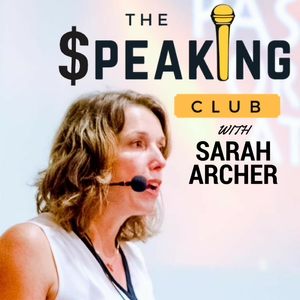
S2E10 - What Makes You Happy?
06/27/22 • 30 min
1 Listener
On today's episode, McKay explores the concept of happiness, including where to find it, and how to hold on to it. To intoduce this rather expansive topic, he opens up the show by reviewing Elizabeth Smart's story - her brutal experience getting kidnapped and raped, and her journey toward happiness. McKay says that, while it's true that happiness is partially dependent upon circumstance, we can also attribute a large portion of our happiness to dedication, the people who raised us, and those with whom we surround ourselves.
He goes on to introduce more conditions for happiness, noting that, when we have admirable intentions and goals in our lives, for example, we find more daily satisfaction. Even the love we share and receive plays a large role in how content we are. McKay draws this highly positive podcast episode to a close by reminding the audience to find joy in the little things, and by offering this invaluable advice: “Stay poised in tough situations—good will prevail. Exercise. Serve. Have Faith. Be humble and watch.... You will be happy.”
The Finer Details of This Episode:
- Elizabeth Smart’s journey
- Happiness dependent on circumstances
- Set happiness
- Taylor Swift’s NYU speech
- The value of intention
- Love and happiness
- Darren’s happy landing
- Focusing on the little things
Quotes:
"As the days passed, she started to realize that this may be her new way of life.”
“He has taken 9 months of your life that you will never get back, but the best punishment you could ever give him is to be happy.”
“Happiness is a choice.”
“Married people report a slightly higher happiness level than single people. In research, 25 percent of married people and 21 percent of single people say they are very happy. In short, circumstances such as wealth or marital status only impact our happiness in small ways.”
“We get more from our parents than eye color and facial features. We may get a large set of our happiness from them or from others. How we grew up or who we have interacted with throughout our life, does dictate our level of happiness.”
“People with aspirations have higher energy levels, stronger immune systems, stronger mental health and feelings of self-confidence and self-esteem.”
“I agree with the researchers. I believe happy people see the best, even in the toughest situations. They are empowered with poise and optimism.”
“Remember, that only 10 percent of happiness depends on circumstances. Fifty percent is heritable. So be a person who sees, talks about and shares the good in life. You can pass on the habit of happiness to others and be a blessing to them.”
“Focusing on the small things in life that bring you joy.”
Links:
On today's episode, McKay explores the concept of happiness, including where to find it, and how to hold on to it. To intoduce this rather expansive topic, he opens up the show by reviewing Elizabeth Smart's story - her brutal experience getting kidnapped and raped, and her journey toward happiness. McKay says that, while it's true that happiness is partially dependent upon circumstance, we can also attribute a large portion of our happiness to dedication, the people who raised us, and those with whom we surround ourselves.
He goes on to introduce more conditions for happiness, noting that, when we have admirable intentions and goals in our lives, for example, we find more daily satisfaction. Even the love we share and receive plays a large role in how content we are. McKay draws this highly positive podcast episode to a close by reminding the audience to find joy in the little things, and by offering this invaluable advice: “Stay poised in tough situations—good will prevail. Exercise. Serve. Have Faith. Be humble and watch.... You will be happy.”
The Finer Details of This Episode:
- Elizabeth Smart’s journey
- Happiness dependent on circumstances
- Set happiness
- Taylor Swift’s NYU speech
- The value of intention
- Love and happiness
- Darren’s happy landing
- Focusing on the little things
Quotes:
"As the days passed, she started to realize that this may be her new way of life.”
“He has taken 9 months of your life that you will never get back, but the best punishment you could ever give him is to be happy.”
“Happiness is a choice.”
“Married people report a slightly higher happiness level than single people. In research, 25 percent of married people and 21 percent of single people say they are very happy. In short, circumstances such as wealth or marital status only impact our happiness in small ways.”
“We get more from our parents than eye color and facial features. We may get a large set of our happiness from them or from others. How we grew up or who we have interacted with throughout our life, does dictate our level of happiness.”
“People with aspirations have higher energy levels, stronger immune systems, stronger mental health and feelings of self-confidence and self-esteem.”
“I agree with the researchers. I believe happy people see the best, even in the toughest situations. They are empowered with poise and optimism.”
“Remember, that only 10 percent of happiness depends on circumstances. Fifty percent is heritable. So be a person who sees, talks about and shares the good in life. You can pass on the habit of happiness to others and be a blessing to them.”
“Focusing on the small things in life that bring you joy.”
Links:
Previous Episode

S2E9 - Speak So People Listen
This week, McKay talks about how to speak so people listen. He opens up the episode with the story of Ronald Reagan’s powerful speech to D-Day veterans at Pointe du Hoc. Great speakers, McKay says, ask questions to connect with the audience and help them feel like the message is for them. To remember and map their speech, good speakers break their speech down into manageable chunks, each with important points to get across. By using chunks, speakers can teach instead of memorizing their lines verbatim. Most importantly though, McKay holds that the key to speaking so that people listen is knowing your strengths and weaknesses. Then, seek to magnify your strengths. It’s your strengths that make your speaking memorable.
He goes on to note that, when we try to mimic someone else’s style by playing to their strengths instead of our own, we come off as fake. That’s why McKay says it’s so important to share personal stories; the more an audience relates to you, the more they will listen to you. McKay also shares some speech 'don’ts' - such as using too many jokes to too much focus on the speaker. He draws this episode to a close by sending a heartfelt message to his friend Austin who has recently embarked on a public speaking journey of his own and encouraging all of us to learn a bit more how to speak so people listen.
Next Episode

S2E11 - The Culture Effect
This week, McKay talks about aspects of the culture effect, including creating culture, maintaining it, and how to rescue it. He opens up with a story detailing Tonga’s devastating volcanic eruption and how the Tongan culture, which values respect and open-mindedness, helped the people weather the storm. McKay notes that, when teams or families have a strong culture, they will thrive and prosper, but, on the other hand, when culture is weak, it can destroy your team and everything you’re working for.
McKay also emphasizes that, as leaders, we have the opportunity to influence and shape the culture that drives us, and goes on to share that, to do so, we must learn to value feedback. So, make sure that you are slow to speak and quick to listen when it comes to creating a culture and values. Likewise, an influential leader will lead by example, sharing and modeling the values by which they hope their team will abide. McKay draws this episode to a close with one final piece of advice: be careful who you let join your team. All it takes is one person to totally alter your culture, so protect it and you will protect your team as well.
The Finer Details of This Episode:
- Tonga’s devastating volcanic eruption
- The fall of IBM
- Defining culture
- Influencing culture
- The importance of feedback
- Sharing and modeling values
- Why mid level managers create culture
Quotes:
"Tongans look out for each other and respect others. Many Tongans may avoid outward signs of wealth or affection. They dress in modest ways, and they're highly receptive to other people's opinion and behavior.”
“Culture can guide a team, lead a company to thrive and prosper, or culture can, like toxic ash, choke a team and cause companies to fail, or fall.”
“Most leaders don't understand culture and they don't know how to diagnose or influence it.”
“Culture can help teams be more agile, loyal and effective... Culture can also be a significant liability when it's misaligned with your strategy or values. And it doesn't matter how dysfunctional your culture may be on your team today, you can improve it with a plan and intentional effort.”
“So, like the researchers in Roseto, you may have to set up camp for a while on your team, maybe even in your family - watch, listen, and observe. See if you can uncover some of the cultural behaviors and assumptions that your team members have.”
“You see, some leaders stopped showing up for the small things. And the result? Their people do the same. What you do duplicates, so if you want to change the culture on your team, model the behavior.”
“Hire and recruit people who exemplify what culture you're trying to create. And over time, these managers will influence your entire team. So be very selective about the people you let influence your team.”
“Listen, learn, and determine where your culture is today to define the mission and values that will underpin your future culture.”
Links:
If you like this episode you’ll love
Episode Comments
Generate a badge
Get a badge for your website that links back to this episode
<a href="https://goodpods.com/podcasts/open-your-eyes-with-mckay-christensen-204984/s2e10-what-makes-you-happy-21651962"> <img src="https://storage.googleapis.com/goodpods-images-bucket/badges/generic-badge-1.svg" alt="listen to s2e10 - what makes you happy? on goodpods" style="width: 225px" /> </a>
Copy




